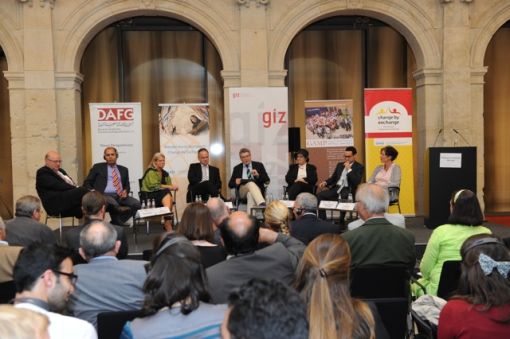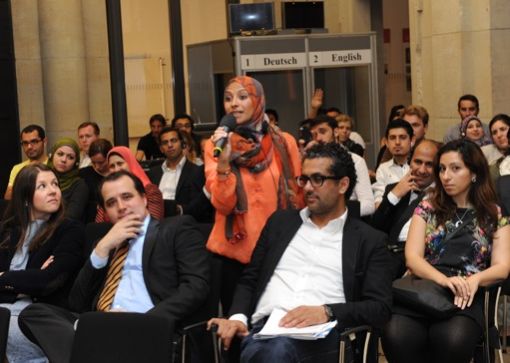What kind of graduates does the Arab economy need right now? This question was front and centre for the DAAD scholarship holders from the German-Arab Master’s programmes taking part in the Parliamentary Evening in Berlin. The evening event, part of the programmes’ Berlin Seminar, was hosted by the Gesellschaft für Internationale Zusammenarbeit (GIZ), the DAAD and the German-Arab Friendship Association (DAFG).
Both university students and employers in the Arab transformation countries find themselves in a predicament. As the Tunisian student Ennouri Maroua explains, “We study hard to get a university degree, but even after eleven years of university, we’re still unsure if we’ll be able to get a job.” The Egyptian Ahmed Marei, CEO of TÜV Nord Egypt, provides an employer point of view: “It is hard to find the right kind of qualified workers for our company – the Egyptian education system does not teach to our needs.”
Lacking: Job orientation and soft skills
Why are university graduates and the labour market seemingly incompatible? As the experts at the Parliamentary Evening explained, the reasons are many. “The majority of university graduates receive training that is simply irrelevant to the current job market,” says Hildegard Vogelmann, head of the Formation et Promotion de l’Emploi des Jeunes project. Funded by the GIZ, the project aims to improve the employability of young individuals. Beate Schindler-Kovats, who heads the DAAD Information Centre in Tunis, agrees. As she points out, the Arab universities do not invest enough in helping students prepare and plan for their careers. Often enough, they end up having to take special courses in soft skills after they have graduated.

Panel members discuss how Arab graduates can succeed on the job market.
Photo:DAFG e.V._Mohamed El Sauaf
There’s a better way
Ennouri Maroua from Tunisia is enrolled the German-Arab “Integrated Urbanism and Sustainable Design” (IUSD) programme at the University of Stuttgart and Ain Shams University in Cairo. Chances are good that things will go differently for her. The bi-cultural Master’s programmes for young professionals – a project from the GIZ and the DAAD – combines a strong development policy focus with practical aspects to give programme graduates what they need to succeed on the job market. “All of the students from my programme were able to find jobs back in their home countries,” reports Husam Aldeen Al Dakak from Syria, an alumnus of the German-Arab „Economic Change in the Arab Region (ECAR)“ programme. The bi-national degree programmes teach the students how to work independently and build their confidence, giving them a decisive leg up in the job search.
Parliamentary Evening 2013: Lively discussion lasts until midnight






